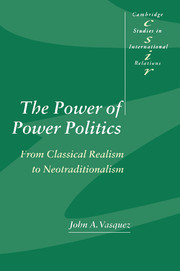Book contents
- Frontmatter
- Contents
- List of figures
- List of tables
- Preface
- Introduction
- Part I The Original Text: Classical Realism and Quantitative International Politics
- Preface to Part I
- Acknowledgments
- 1 The role of paradigms in scientific inquiry: a conceptual framework and a set of principles for paradigm evaluation
- 2 The role of the realist paradigm in the development of a scientific study of international relations
- 3 Research design: defining and operationalizing the realist paradigm
- 4 Theory construction as a paradigm-directed activity
- 5 Data making as a paradigm-directed activity
- 6 Research as a paradigm-directed activity
- 7 Evaluation: the adequacy of the realist paradigm
- 8 Theory and research in the 1970s: the emerging anomalies
- Part II Neorealism and Neotraditionalism: International Relations Theory at the Millennium
- References
- Name index
- Subject index
- CAMBRIDGE STUDIES IN INTERNATIONAL RELATIONS
2 - The role of the realist paradigm in the development of a scientific study of international relations
Published online by Cambridge University Press: 22 September 2009
- Frontmatter
- Contents
- List of figures
- List of tables
- Preface
- Introduction
- Part I The Original Text: Classical Realism and Quantitative International Politics
- Preface to Part I
- Acknowledgments
- 1 The role of paradigms in scientific inquiry: a conceptual framework and a set of principles for paradigm evaluation
- 2 The role of the realist paradigm in the development of a scientific study of international relations
- 3 Research design: defining and operationalizing the realist paradigm
- 4 Theory construction as a paradigm-directed activity
- 5 Data making as a paradigm-directed activity
- 6 Research as a paradigm-directed activity
- 7 Evaluation: the adequacy of the realist paradigm
- 8 Theory and research in the 1970s: the emerging anomalies
- Part II Neorealism and Neotraditionalism: International Relations Theory at the Millennium
- References
- Name index
- Subject index
- CAMBRIDGE STUDIES IN INTERNATIONAL RELATIONS
Summary
Kuhn's analysis implies that a proper understanding of the historical development of any science involves identifying the rise of a paradigm and how it is displaced. In this chapter, a historical interpretation of how the scientific study of international relations is conducted will be offered by drawing on a number of Kuhn's insights. Although the study of international relations can be said to go back at least to the time of Thucydides, the starting date of this analysis will be the formal creation of international relations inquiry as an institutionalized discipline. This is commonly taken to have occurred in 1919, with the creation of “the world's first Chair in International Politics … at the University College of Wales, Aberystwyth” (Porter 1972: ix).
In the interpretation, emphasis will be placed on delineating the role the realist paradigm has played in international relations inquiry, and the relationship between that paradigm and idealism and the behavioral revolt. The resulting analysis shows how the idealist paradigm helped institutionalize the discipline and instill it with purpose, how the anomaly of World War II led to the displacement of the idealist paradigm and to the dominance of the realist paradigm, and how the behavioral revolt did not change the paradigm of the field but provided a conception of scientific methodology. Only historical examples will be given here to demonstrate the plausibility of the interpretation, but systematic evidence will be presented in chapters 4 through 6.
- Type
- Chapter
- Information
- The Power of Power PoliticsFrom Classical Realism to Neotraditionalism, pp. 32 - 44Publisher: Cambridge University PressPrint publication year: 1999



